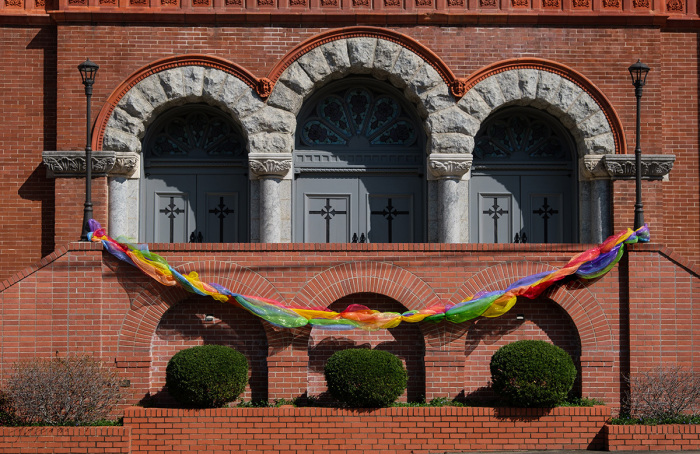Universalism and open Heaven: Pastor identifies the signs of a ‘woke’ church

A pastor and podcaster recently provided valuable advice to Christians searching for a new church, cautioning them about specific warning signs that indicate a church might be embracing "woke" ideology.
Pastor Lucas Miles is the author of the book Woke Jesus: The False Messiah Destroying Christianity, which is scheduled for release next month.
In a May 4 episode of the "Politely Rude With Abby Johnson" podcast, Miles shared tips for Christians on how to discern the red flags when church hunting. It's crucial for believers to be aware of these red flags and exercise discernment when evaluating potential churches, he said.
Miles contends that “churches have been invaded" by various ideologies, such as the Black Lives Matter movement, the LGBT movement and critical race theory.
“Of course, the very obvious things. If the flag is rainbow colored, or if there's a BLM flag flying above the cross outside, then that might be something to note,” Miles said.
Miles emphasized the importance of asking a set of crucial questions before Christians decide to join a church. He stressed the need for careful observation of signs that may indicate a church's alignment with "wokism."
“You want to listen for language, maybe, of critical race theory, Miles told Johnson, a pro-life activist. "So, are they talking about white fragility?"
"Are they using this word 'diversity' all the time? Are [the church leaders] more focused on that than [they] are about just loving people because Christ has called us to love everybody?”
Miles emphasized that a church rooted in biblical principles will not embrace a distorted understanding of grace and truth as its fundamental theology.
“Is there still a handle on grace and truth? So, one of the things I always tell people is that … the Bible tells us … ‘The law was given by Moses, but grace and truth came through Jesus Christ,’” Miles shared.
According to Miles, any deviation into heresy tends to occur through two avenues: an excessive emphasis on grace or a problematic distortion of the truth. He emphasized the importance of remaining vigilant in both aspects of the equation.
"If you are elevating grace over truth, you become a progressive. If you elevate truth over grace, you become a bigot. We need both of those in full force,” he said.
Some other signs of a woke church, according to Miles, is if it teaches a Universalist view on salvation. Universalism promotes the idea that all people, regardless of what they believe, will be saved.
“Are they teaching an open Heaven?" Miles said. "That you can go to Hell, but maybe get out of it later on in life and kind of work your way back to Heaven? That would be something to watch for."
Miles advised Christians not to hesitate in scheduling meetings with the pastor or elders of prospective churches to inquire about the church's stance on specific topics. This proactive approach, he said, allows believers to gain clarity and make informed decisions.
Miles also said that one way to look for red flags that a church is “woke” is by looking at a church’s website and biographical information about its church staff.
“Does the pastor have pronouns in his bio? That's probably something that you want to look for and really recognize there,” Miles said. "I think also asking them what other nonprofits they support."
Miles addressed Christian listeners who have children, advising them to exercise caution by asking questions to church leaders and conducting research before their children become deeply involved in a particular church.
“I think that you have the right if you're going to attend there, and you're going to give money there, to just come out and ask them … 'Where do you stand on the issue of abortion, marriage, sexuality? Do you hold to a biblical framework? Do you perform gay weddings here at the church?'” Miles advised asking.
“Just ask those questions, just flat out, so that you don't have to wonder and you're not attending there for three or six months and your kids get invested in relationships and then you realize it's a problem,” he continued. “And what happens then, a lot of times, is people will stay because they don't want conflict. They will stay in [the church], many times, and justify rather than [leave] over these issues.”
Nicole Alcindor is a reporter for The Christian Post. She can be reached at: nicole.alcindor@christianpost.com.




























